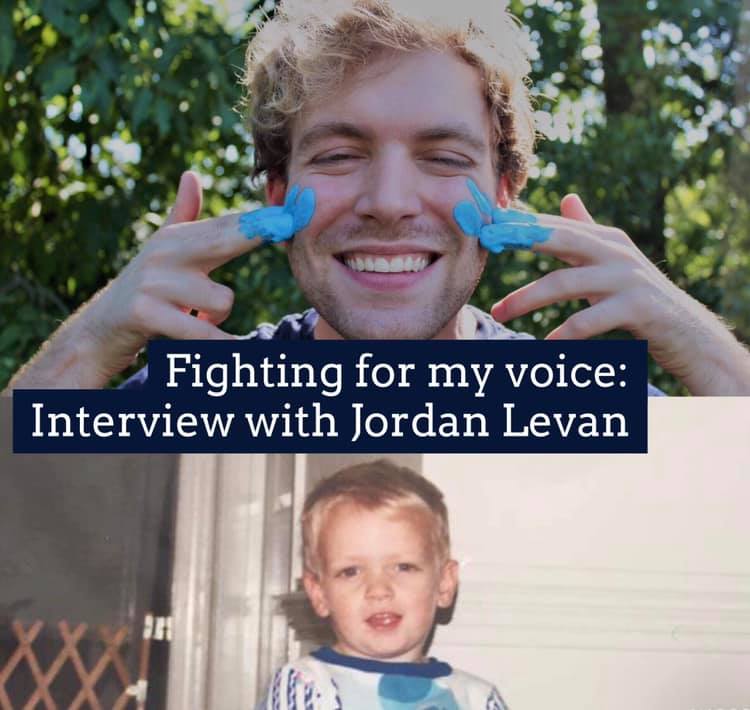Fighting for my voice: Interview with Jordan LeVan
Today I am so excited to have Jordan LeVan with us to contribute and tell his story for my growing up with apraxia page! Jordan is a 22-year-old in college studying psychology. I’ve gotten to know him through the magic of social media, where he shares stories about his life and posts informational and inspiring messages about living with verbal Apraxia. You should check him out on Facebook, Instagram, and YouTube!

Hi Jordan! Can you start by telling us a little bit about yourself?
Hello! I’m Jordan, and I’m 22 years old. I was diagnosed with Verbal Apraxia at five years old, and since then, I have been fighting for my voice. I advocate for those with Apraxia and speech issues, and I run a page called “Fighting for my Voice: My life with Verbal Apraxia.” I’m currently a college student at Guilford College, and I am majoring in Psychology. I enjoy writing, photography, and making people laugh and smile. I enjoy using creative outlets.
When were you first able to speak?
I was considered “nonverbal” until the age of 5, and at that age, I began saying full words more. However, speaking was still extremely difficult for me. I remember at the age of eight stomping my foot into the ground, just trying to get out a single word. I was able to speak to strangers and be understood by the age of 12.
What was the hardest thing about growing up with Apraxia?
Nobody knew what it was. The lack of education was so real. I had no resources or outlets besides speech therapy. None of my speech therapists during this time had ever worked with a kid with Apraxia; this was in 2002. I felt like I didn’t understand my condition at that age. It was so confusing, frustrating, and overwhelming all at the same time. I also didn’t think anybody else had Apraxia, due to the lack of awareness during this time; this was difficult for me because I never had anybody I could relate to.
What was your school experience like? Can you tell us how it affected you not only academically but socially?
My school experience was rough, and I would be lying if I put it any other way. I couldn’t read nor write until I was in the third grade, and teachers weren’t understanding of this. I got unfair treatment from not only teachers but also speech therapists. My kindergarten speech therapist would leave me outside her classroom because she didn’t know how to treat a kid with a diagnosis of Apraxia. When teachers would come up and ask me who I was, I couldn’t tell them my name. The social aspect of not being able to say to others your name brought on feelings of panic from a young age. The social component of me connecting with my peers was challenging. I got bullied from a young age. I had to be pulled out of public school in the sixth grade; this was because the bullying was too extreme.
How has Apraxia affected your life? What are some residual effects you have?
Apraxia affected my life so early that I wouldn’t know a life without it. Some residual effects that I have are my voice volume level. I often speak quietly, and I sometimes don’t even realize it. Until others are like “Speak louder.” Those cues help me understand. It also affects my tone of voice. I often sound monotone if I’m not putting work into it. I also struggle with getting out words fully and fluency. I’m a constant work in progress.
Most parents are very worried about their child’s future when they are diagnosed with Apraxia. What advice do you have for them?
Be your child’s biggest advocate. You’re going to have to fight hard to get your child proper services. However, it is so worth it. Normalize conversations about Apraxia. Help them be open with others about their diagnosis. From a young age, help them accept this is a part of their life, and it will make them stronger. Along the way, teach them how to advocate for themselves. I’m always advocating for myself, and I know my rights. Just because I am not neurotypical, doesn’t make me any less of a person. Let them know their value and their rights.
You are truly an inspiration, and I’m so grateful for you speaking out! Do you have any final thoughts?
My life with Verbal Apraxia hasn’t been easy as you can tell. However, I wouldn’t be the person I am today if I didn’t have it. I’m not sure if I would trade it or not, because it’s made me a compassionate and understanding person. It’s showed me a different perspective on life. I don’t believe I went through my struggles for nothing. I believe I went through my struggles to help others. If I can help others, me struggling to get out words is worth it. I want other people with Apraxia to know that you were built for this. The fact you wake up everyday, and decide to push forward while your brain is trying to hold you back is brave. Despite my struggles, I refuse to go down without a fight.
So well said Jordan! Refuse to go down without a fight. Thank you so much for guest blogging today! Keep spreading your message because you are helping more people than you even know.
Growing up with apraixa is part of an ongoing series that aims to celebrate neurodiversity and highlight those who have grown up with Childhood Apraxia of Speech and related struggles. If you are interested in being featured, send an email to lauraslpmommy@gmail.com